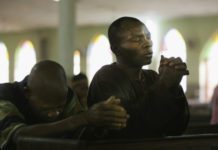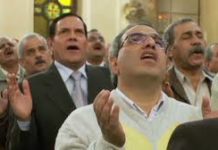By BosNewsLife Middle East Service with reporting by BosNewsLife’s Stefan J. Bos

CAIRO, EGYPT (BosNewsLife)– Egypt’s President-elect Mohammed Morsi said Sunday he will the leader of “all Egyptians,” amid concerns among the country’s minority Coptic Christians about their future and indirectly tried to calm down Israel.
Addressing his nation in live televised remarks, the Moslim Brotherhood’s Morsi also said he would respect “international agreements” in a clear message to Israel which is closely watching how Cairo will implement the peace agreement it signed in 1979.
Yet, the 60-year-old Morsi earlier said that he would not meet Israeli officials, promising instead to prioritize the Palestinian issue.
One of his supporters, cleric Safwat el-Hegazy, also issued a direct challenge to Israel, calling for a Muslim super-state across the Middle East with Jerusalem as its capital.
Morsi later distanced himself from the cleric’s comments.
“UNIFYING EGYPTIANS”
He reiterated Sunday, June 24, that he wants to be seen unifying all Egyptians, including Christians, adding that those who died while protesting more than a year ago will be remembered. “Their blood will not go in vain,” he said.
That will be closely watched by minority Coptic Christians, who comprise roughly 10 percent of the country’s population. Some 100,000 Christians are estimated to have fled the nation amid deadly sectarian clashes and attacks against churches.
Despite his attempts to appear as a person seeking reconciliation, there is concern among Christians as before Sunday’s remarks, Morsi made clear he wanted to put into practice the Brotherhood’s famous slogan – “Islam is the solution”.
He also described its policy plans as having “a moderate Islamic reference” and reportedly promised to institute Islamic law.
Morsi spoke to his nation after Egypt’s central election commission declared him the country’s first Islamist president on Sunday with 51.7 percent of last weekend’s run-off vote.
AHMED SHAFIQ
He defeated Ahmed Shafiq, a former prime minister under ousted President Hosni Mubarak, who was reportedly favored by Christians.
Morsi’s election prompted crowds to wave the national flags, chanting “Allahu Akbar!” or “Allah is great!” in Cairo.
He will be sworn in on July 1, according to the election timetable.
Mohammed Mursi was born in a village in the Nile Delta province of Sharqiya and is married with four children.
He studied Engineering at Cairo University in the 1970s before moving to the United States to complete a PhD.
GUIDANCE BUREAU
After returning to Egypt he became head of the engineering department at Zagazig University and eventually rose in the ranks of the Muslim Brotherhood and joined its Guidance Bureau.
He served as an independent in the Brotherhood’s parliamentary bloc from 2000 to 2005 and later lost his his seat, after a run-off vote that he claimed was rigged.
However he remained a spokesman for the Brotherhood and last year, after the uprising forced Hosni Mubarak to step down, he eventually became its presidential candidate.
Yet his power has been limited by the governing Supreme Council of the Armed Forces (SCAF), which also granted itself more legislative powers, control of the economy and the right to pick who will draft the next constitution.
Under the new rules, whoever becomes the next head of state, has less influence than previously planned.
Egypt’s new president can form and fire a government, ratify or reject laws and declare war, but only after SCAF’s approval.








